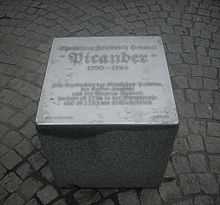Picander
Christian Friedrich Henrici (January 14, 1700 – May 10, 1764), better known as Picander, was a German poet and librettist for many of the cantatas which Johann Sebastian Bach composed in Leipzig. Henrici studied law at Wittenberg and Leipzig. He wrote to supplement his income and continued even after as a civil servant.

Bach moved to Leipzig in 1723. There is uncertainty as who was writing his libretti in his first years in. The libretti for the chorale cantatas cycle of 1724/25 are anonymous. By 1725, Henrici and Bach were working together. Some of Bach's most important works used Henrici's libretti. Most notably their collaboration was on religious works in a Lutheran tradition such as the St Matthew Passion (BWV 244). However, they also produced secular works such as the Coffee Cantata (Schweigt stille, plaudert nicht, BWV 211).
All five volumes of Picander's Ernstschertzhaffte und satyrische Gedichte (Leipzig, 1727–51) contain texts set to music by J. S. Bach, including those for the St Matthew Passion and its associated funeral music for Prince Leopold of Anhalt-Cöthen (Klagt, Kinder, klagt es aller Welt, BWV 244a). In some cases, Henrici's texts have survived and Bach's settings have not. Examples of lost scores include those for the funeral music for Prince Leopold and the St Mark Passion (BWV 247), althoug there are clues as to what music Bach would have used to set the words. Bach, sometimes returned to compositions commissioned for one-off occasions and recycled the music. Picander was able to help the composer in this process by providing metrically similar new texts, effectively setting words to Bach's music.
In the preface to the third volume (1732) Picander claimed that J. S. Bach set a whole cycle of his cantata texts in 1729.[1] Only nine of J. S. Bach's settings are known to have survived (they include the cantatas for Christmas Ehre sei Gott in der Höhe, BWV 197a, New Year Gott, wie dein Name, so ist auch dein Ruhm, BWV 171, Whit Monday Ich liebe den Höchsten von ganzem Gemüte, BWV 174, and the feast of St Michael Man singet mit Freuden vom Sieg, BWV 149) the statement made in the preface has been debated.[1][2]
References
- ↑ 1.0 1.1 Biography of Picander at Last.fm
- ↑ However, since those compositions which have survived are spread widely over the liturgical year, it is not impossible then that J. S. Bach did indeed set to music all the texts in that volume, as claimed by the preface, and that those compositions are now lost.
External links
- "Henrici, Christian Friedrich (Pseudonym: Picander)", Biographisch-Bibliographisches Kirchenlexikon (registration required)
(German)
|